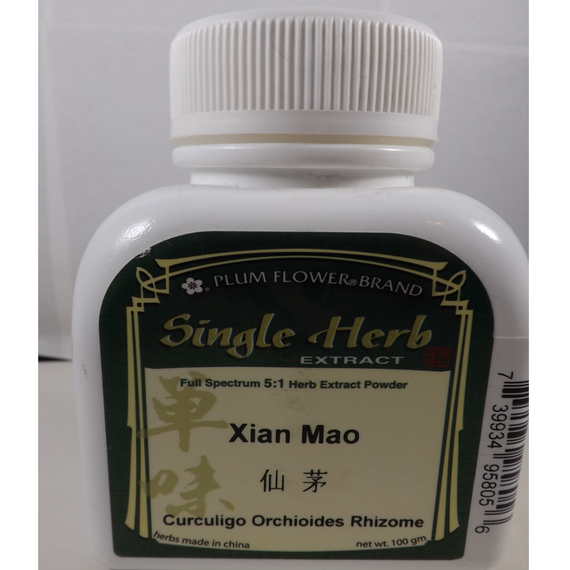Guide to Golden Eye Grass (Xian Mao) in Traditional Chinese Medicine
Golden Eye Grass, known as Xian Mao (仙茅) in Traditional Chinese Medicine (TCM), is a perennial herb renowned for its medicinal properties. This guide outlines what Xian Mao is, how to use it effectively, and the mechanisms through which it exerts its benefits.
What is Xian Mao?
Xian Mao, scientifically named Curculigo orchioides, is a flowering plant traditionally utilized in TCM. It is particularly valued for its ability to enhance kidney function, improve sexual health, and strengthen overall vitality.
Key Properties:
- Category: Tonifying herb
- Taste: Bitter, slightly sweet
- Nature: Warm
How to Use Xian Mao
Xian Mao can be consumed in various forms:
| Form | Description |
|---|---|
| Decoction | Dried roots are boiled in water to extract active compounds. |
| Powder | Dried and ground into a fine powder; can be mixed with water or taken in capsules. |
| Tincture | Soaked in alcohol or vinegar to create a concentrated extract. |
Combination with Other Herbs
Xian Mao can be effectively combined with other herbs to enhance its effects. Common combinations include:
| Herb | Purpose |
|---|---|
| Gou Qi Zi (Goji Berries) | Boosts immune function and promotes longevity. |
| Dang Gui (Angelica Sinensis) | Nourishes blood and promotes circulation. |
1. Kidney Function Support
Xian Mao is primarily recognized for its ability to strengthen and tonify the kidneys. It enhances the production of essential hormones and supports kidney Qi, which is vital for overall vitality and reproductive health.
2. Aphrodisiac Properties
This herb is often used to enhance sexual performance and libido. Its warming properties stimulate blood circulation, contributing to improved sexual function.
3. Hormonal Balance
Xian Mao aids in balancing hormones, particularly in individuals experiencing hormonal imbalances. This action further supports reproductive health and vitality.
4. Anti-Inflammatory Effects
Research indicates that Xian Mao possesses anti-inflammatory properties. This may help alleviate symptoms associated with chronic conditions, leading to improved overall health.
Conclusion
Golden Eye Grass (Xian Mao) is a significant herb in Traditional Chinese Medicine, celebrated for its versatility and effectiveness in promoting kidney health and vitality. Proper understanding of its usage and mechanisms can empower individuals to harness its benefits. It is advisable to consult a qualified TCM practitioner before beginning any herbal regimen to ensure safety and efficacy based on individual health conditions.
Herbal Information on Golden Eye Grass
Product Description
Common Name: Golden Eye Grass
Botanical Name: Xian Mao
Channels/Meridians: Kidney, Liver, Spleen
Pin Yin Name: Curculigo orchioidis rhizoma
Other Ingredients: None, nothing has been added to this product.
Package Size: 500 Grams ( 1.1 pounds)
Form: Powder -Cut Unsulfured
Brand: Plum Flower, species - authenticated herbs
Cautions: Do not use if pregnant or nursing. Not for long term use
Summary of Golden Eye Grass
- Acrid, hot, mildly toxic
- Tonifies kidneys
- Reproductive restorative


Check out our How to Use Bulk Herbs page to see how to use herbs correctly.
About Plum Flower Quality Herbs
Plum Flower is an established worldwide manufacturer of high-quality Chinese herbs, and innovative Chinese medicinal herbs and products. Plum Flower uses sulfur-free herbs and laboratory tests its products for contamination and heavy metals, such as mercury, lead, and pesticides.
- Made at GMP internationally certified facilities (Good Manufacturing Practices) Quality control tests are done at the manufacturing site and at third party labs to confirm results.
- Manufactured using Unsulfured, Chlorine free, Aluminum Phosphate free herbs when possible.
- Microbials and heavy metals tested. No preservatives.
Chinese Traditional herbs should be regarded as an added feature to modern western healthcare, and not as a replacement. Chinese traditional herbs ( Teas ) emphasize harmony, and balance.
References:
https://www.ncbi.nlm.nih.gov/pmc/articles/PMC8565213/
https://www.sciencedirect.com/science/article/pii/S0378874112005454
























